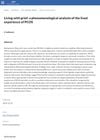Coping in Women With Polycystic Ovary Syndrome: Implications for Practitioners
September 2017
in “
The Journal for Nurse Practitioners
”

TLDR Most women with PCOS use positive coping strategies, but some with more psychological stress use negative ones.
The study investigated coping strategies in 72 women with Polycystic Ovary Syndrome (PCOS) in the United States, finding that while most women employed adaptive coping strategies such as social support, problem-solving, and positive reappraisal, about 31% with higher psychological severity scores resorted to maladaptive strategies like escape-avoidance. These women also used less problem-solving and positive reappraisal. The study underscores the role of nurse practitioners in promoting adaptive coping strategies in women with PCOS, who face stress from managing symptoms and increased health risks. The coping framework used was the Transactional Model of Stress and Coping, and the study utilized the Ways of Coping Questionnaire, Beck Depression Inventory-II, and the Trait-Anxiety scale for assessments. The study also observed cultural differences in coping strategies and noted limitations such as a non-generalizable convenience sample and the potential impact of daily medications on psychological assessments.






